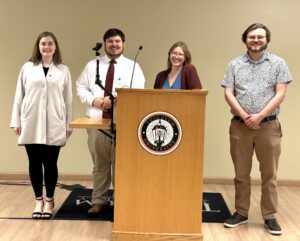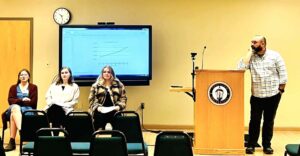GREENEVILLE – Four history majors at Tusculum University demonstrated their knowledge on varied local, state and national subjects during a recent conference for college students that was held on campus.

Tusculum students who participated in the conference were, left to right, Samantha Nelson, Hughston Burnheimer, Sydney May and Chris Colmer.
Tusculum’s Alpha Pi Alpha chapter hosted the Tennessee Regional Conference of the national Phi Alpha Theta history honor society Saturday, March 23, in Chalmers Conference Center. The event brought students from Tennessee, North Carolina and Alabama universities to discuss their research.
“We were thrilled to host the conference and showcase what our students have learned from their active and experiential coursework at Tusculum,” said Dr. Jeffrey Perry, associate professor of history, who served as the conference’s organizer. “Research is an important element of a Tusculum student’s undergraduate experience, and our history students’ presentations during the conference demonstrate their growing ability to develop original research questions, evaluate both archival materials and secondary sources and disseminate their findings. Such skills are valuable for myriad careers.”
The Tusculum students who presented were senior Hughston Burnheimer, sophomore Chris Colmer, senior Sydney May and senior Samantha Nelson. Here are their presentation titles:
- “Public History at the James K. Polk House Home and Museum: A Collaborative Exhibit Project” – Burnheimer, Colmer and May
- “Historic and Cultural Origins of Modern Israeli Constitutional Debate” – Burnheimer
- “The African-American Experience in Nineteenth Century Seneca Village, New York, and After Displacement” – Nelson
- “Hillbilly Highway and Southern Migration: A Case Study of Horse Creek” – May
Two of the presentations involve projects in which Tusculum students and faculty have been involved for a while.
The Horse Creek presentation was an extension of a project that spanned about three years and was conducted by Tusculum history students and history and sociology faculty members. They further detailed that community’s history and evolution through the accounts of those who have lived there or had relatives from that community.
The group built on interviews of about 30 Horse Creek residents from the mid-1980s that explored the community’s way of life throughout its history. Tusculum conducted 10 new interviews of residents or those who had relatives that had lived there.
May is examining broader regional patterns of 20th century migration by southern Appalachia residents to northern industrial jobs. She contends that burley tobacco agriculture, combined with off-farm income, in the mountain tobacco region centered in Greene County blunted economic realities that affected large swaths of Southern Appalachia. She will use the Horse Creek oral history interviews to contextualize the demographic data that underpins her argument.

Tusculum students Sydney May, far left; Samantha Nelson, second from left; and Dr. Peter Noll, far right, were some of the Tusculum representatives. Second from the right is Taylor Bowman from East Tennessee State University.
The Polk presentation addressed a project in which Burnheimer, Colmer and May are developing an exhibit for the President James K. Polk Home and Museum this semester. The exhibit’s subject matter is Polk’s presidency and delves into the implications of this tenure in office, which lasted from 1845-1849. Specifically, the group is exploring how western expansion drives political controversy, culminating in the Civil War, and Polk’s connection to it.
Dr. Perry collaborated with Tusculum’s College of Civic and Liberal Arts to bring the conference to fruition. In addition, he joined Tusculum’s other three full-time history faculty members – Dr. Angela Keaton, Dr. Peter Noll and Dr. Joel Van Amberg, who also serves as the chair of the History, Museum Studies and Religion Department – as panel chairs.
“We have impressive history majors, and it was a pleasure to watch them utilize what they have learned in the classroom and on their own and apply it to this type of setting,” Dr. Van Amberg said. “Through the one-on-one connections they have developed with their faculty mentors and their own diligence and intelligence, our history students are well on their way to making their mark as career-ready professionals.”
Phi Alpha Theta, which dates to 1921, is a nationally certified academic honor society for colleges and universities with a mission to promote the study of history through the encouragement of research, good teaching, publication and the exchange of learning and ideas among historians.
Tusculum’s Alpha Pi Alpha chapter was chartered in 2015.
Additional information about Tusculum’s history program is available at https://site.tusculum.edu/history/. To learn more about the university, please visit www.tusculum.edu.


